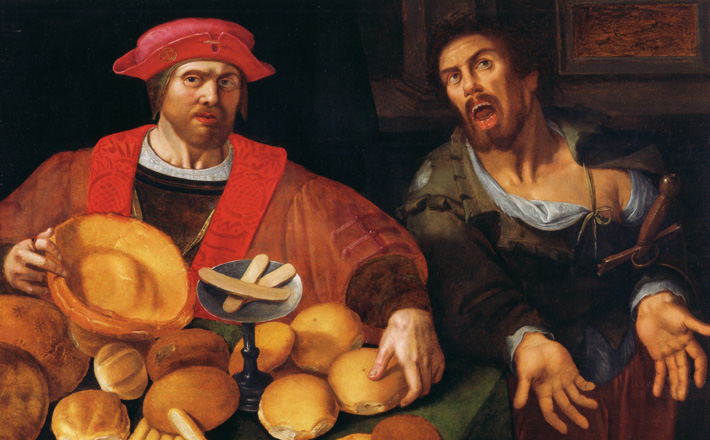Commentary on Luke 16:1-13
Any commentator will tell you that this is a difficult text.
The story itself sounds quite contemporary. A dishonest manager is about to lose his job because he has misspent his employer’s assets. Because he doesn’t want to do manual labor or receive charity, he goes around to all the people who owe his employer money and reduces their debts. He does this so that they will be hospitable to him after he loses his job. To our surprise, the employer commends the dishonest manager for his shrewdness. Why is he commended? And, why does Luke include this story in his Gospel?
To begin to answer these questions, we can note that this parable serves as a bridge between the stories of the Prodigal Son (15:11-32) and the Rich Man and Lazarus (16:19-31). Like the prodigal in the preceding story, our dishonest manager has “squandered” what was entrusted to him (15:13; 16:1). And, like the story that follows, this parable begins with the phrase, “There was a rich man” (16:1, 19).
Although our dishonest manager does not repent (like the prodigal) or act virtuously (like Lazarus), he nonetheless does something with the rich man’s wealth that reverses the existing order of things. In Luke, reversals of status are at the heart of what happens when Jesus and the kingdom of God appear. The proud are “scattered” (which translates the same word for “squandered”: dieskorpisen). The powerful are brought down and the lowly lifted; the hungry are filled and the rich are sent away empty (1:51-53; see also 6:24; 16:25; 18:25).
But why does the employer commend the dishonest manager for being shrewd? Of course, his commendation could be ironic. But if it’s not ironic, then why is the manager being commended? Some commentators have suggested that the manager has reduced his own commission in the debts owed and that this is what is being commended. Yet others have suggested more generally that the employer is simply commending the manager for responding shrewdly to a difficult circumstance. The word for “shrewd” here (phronimos) can also be translated as “prudent” or “wise” (16:8).
The text itself provides four interpretations of the employer’s commendation. First, “the children of this age are more shrewd in dealing with their own generation than are the children of light” (16:8). In other words, Jesus’ disciples — often referred to as “children of light” (see John 12:36) — could learn something about acting prudently from the “children of this age.”
Second, what they could learn from the “children of this age” has to do with “making friends for themselves” by means of “dishonest wealth” so that those new friends might “welcome them into the eternal homes” (16:9). Instead of using “dishonest wealth” to exploit others (as the rich do), disciples are to use wealth to “make friends for themselves.” If friendships are based on reciprocal and egalitarian relationships, then releasing other people’s debts not only enriches them, but also establishes a new kind of reciprocity with them. The Filipino concept of utang na loob, which literally translated means an “inner debt” or a “debt of inner gratitude,” perhaps captures something of what is being established here — a debt rooted in the shared reciprocity of friends.1
As a broader context for this, we might note that Luke often depicts how Jesus’ ministry and that of his followers is dependent on the hospitality of others (8:3; 10:7). Moreover, hospitality is often provided by those who are considered religious outsiders or lower down on social hierarchies (e.g., the Good Samaritan, 10:33; tax collectors, 5:27-39; 19:1-10; Cornelius, 10:48, etc.).
Third, there’s a connection between being faithful (or dishonest) with “very little” and “very much.” How one deals with “dishonest wealth” and “what belongs to another” says much about how one will deal with “true riches” and “what is your own” (16:10-12). How we use the resources at our disposal in this life — especially in tight circumstances — matters, even though our “true riches” can only be found in that place “where no thief can draw near and no moth destroys” (12:33-34).
Finally, the capstone to all this is that “no slave can serve two masters … you cannot serve God and wealth” (16:13). This reiterates a central theme in Luke. The kingdom of God entails giving up all other commitments, including the commitment to economic security (14:33; 18:18-25). As noted, Luke places great emphasis on how the reign of God reverses the status of the rich and the poor (1:51-53; 6:20). In Acts, the Christian community is one where disciples share “all things in common,” distributing “to all, as any had need” (2:44-45). These texts cannot just be spiritualized. Luke is talking about a different way of using wealth. Our wealth belongs to God and is to be used for the purposes of God’s reign among us and not simply for our own interests.
So why is our dishonest manager shrewd? Even though he is still sinner who is looking out for his own interests (6:32-34), he models behavior the disciples can emulate. Instead of simply being a victim of circumstance, he transforms a bad situation into one that benefits him and others. By reducing other people’s debts, he creates a new set of relationships based not on the vertical relationship between lenders and debtors (rooted in monetary exchange) but on something more like the reciprocal and egalitarian relationships of friends.
What this dishonest manager sets in play has analogues with what happens when the reign of God emerges among us (17:21). Old hierarchies are overturned and new friendships are established. Indeed, outsiders and those lower down on hierarchies now become the very ones we depend upon to welcome us — not only in their homes in this life, but even in the “eternal homes” (6:20-26)!
1Katrin de Guia, Kapwa: The Self in the Other: Worldviews and Lifestyles of Filipino Culture-Bearers (Pasig City: Anvil Publishing, 2005), 378.


September 22, 2013